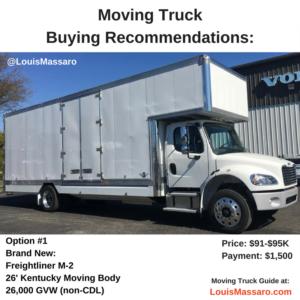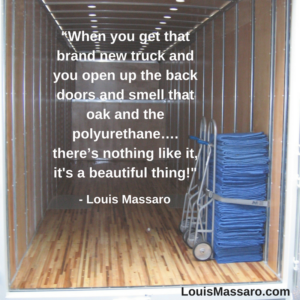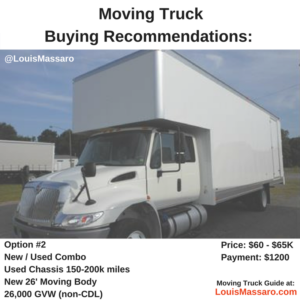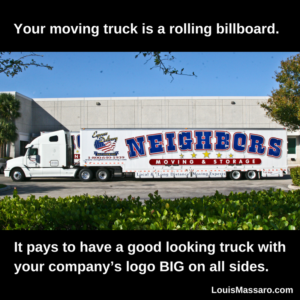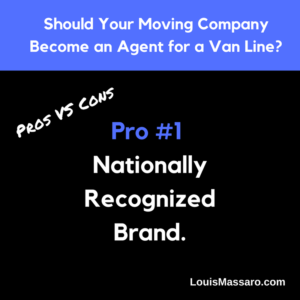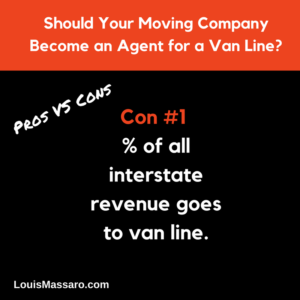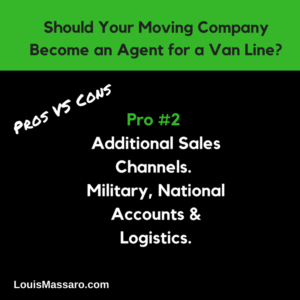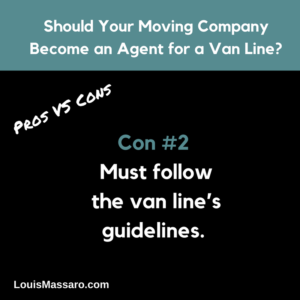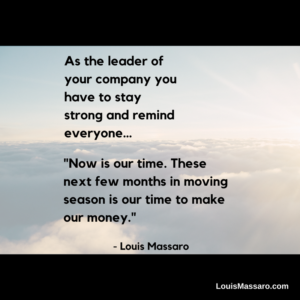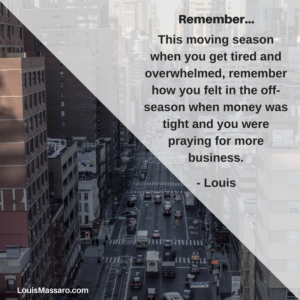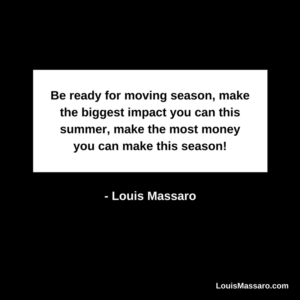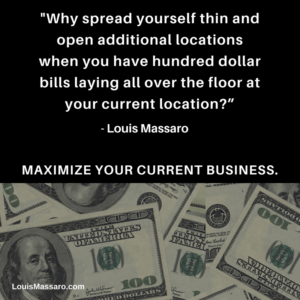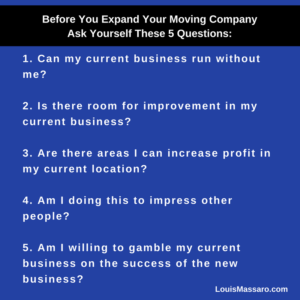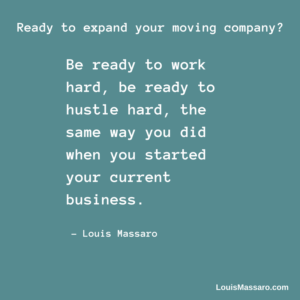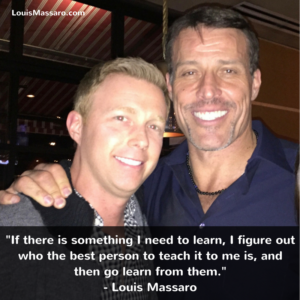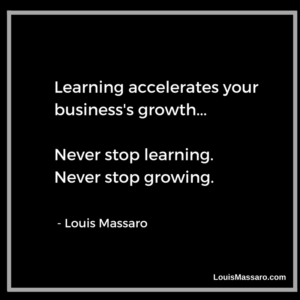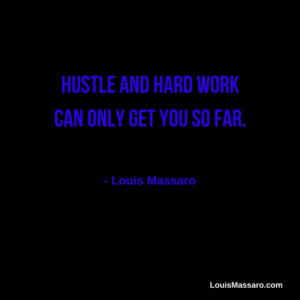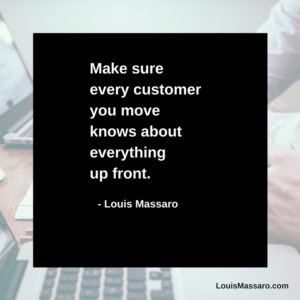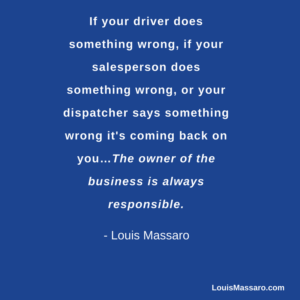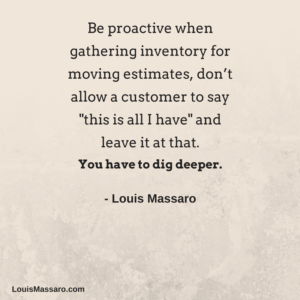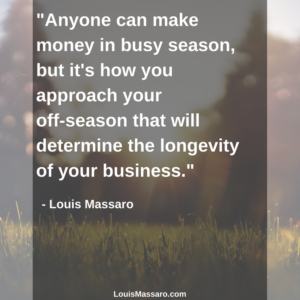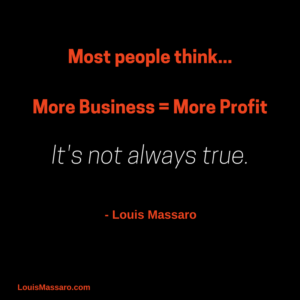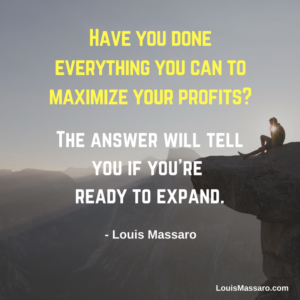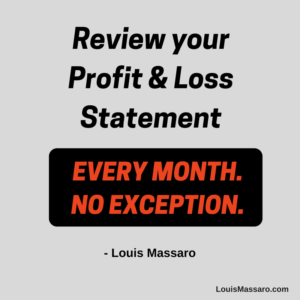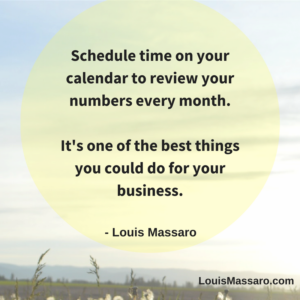[fb_button]
Plan to start working ON your moving company and not IN it.
- Work IN your business to create processes – Before you can step away and start enjoying the true benefits of owning a business you have to spend some time working in your business. You’ll need to see what works and what doesn’t and create processes around it. Before you can step back you will need these processes to train your employees how you want things done.
- Train and groom your replacement – Once you have established your processes, you’ll want to start stepping away from each position in your company that you currently fulfill. For example, if you are dispatching all of your trucks, you’ll hire a dispatcher and train them and groom them to do things how you do them. Then you’ll move on to other areas of the business like sales, accounting and so on.
- Fine tune your systems and S.O.P’s – Now that you’ve stepped away from a position and are able to watch someone else handle it, you’re going to want to fine tune your standard operating procedures (SOP). The process may need to be adjusted based on the way you used to do it yourself vs. how you want your employee to do it.
- Develop your K.P.I’s – Now that your systems are running smoothly and your employees are the ones running them, you need some reports. Key performance indicators (KPI) are a set of metrics that measure how well each area of your business is doing. Having these numbers is a crucial step in being able to step away from your moving company.
- Manage your business from reports and meetings – This is the ultimate goal. If you have other people running the day to day of your business and you’re able to see how they are doing based on the reports, you gain clarity. Now you can review your reports and have meetings with your staff to provide leadership and direction.
- Focus on business development – So now that everything is running smoothly and you have the right people in place and the right systems, what do you do with your time? You focus on making your company better, you focus on expansion and growth. At this point, you can see things more clearly and it becomes much easier to put new initiatives in place.
You owe it to yourself to set up a business that works for you and not the other way around. Then you will have a smooth running company, and be able to take the time to enjoy your life.
Watch the video above for the full episode.
Like this episode? Please share it! My blog and videos are ad-free ONLY because you share my work!
How can I help? What challenges are you facing in your business? What areas could you use some tips in?
Leave me a comment below and I will be more than happy to get back to you or post a video on the topic.
Follow Louis on Instagram for daily tips and motivation to grow your moving company.
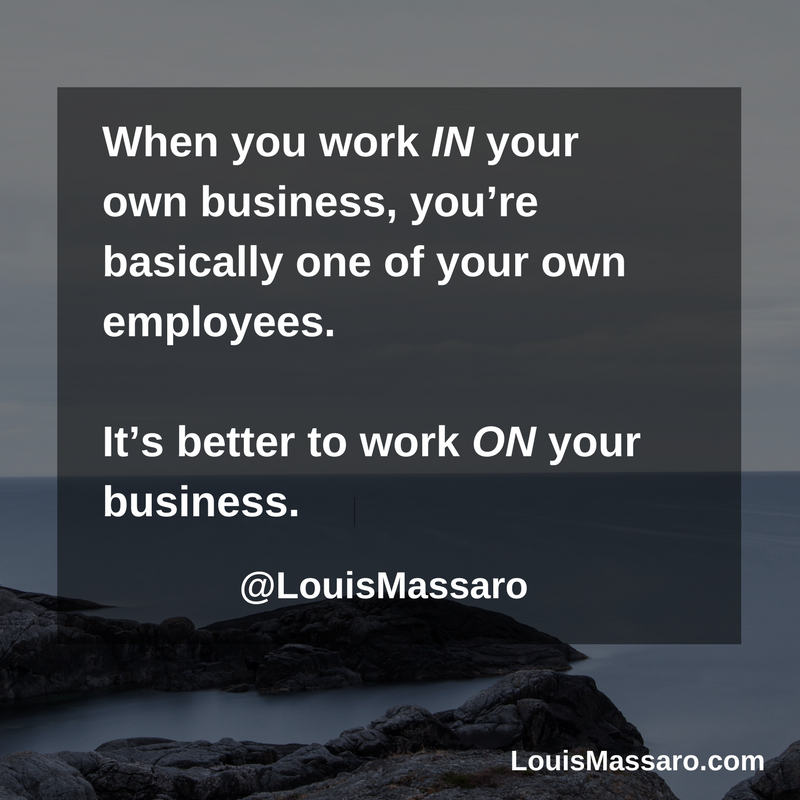
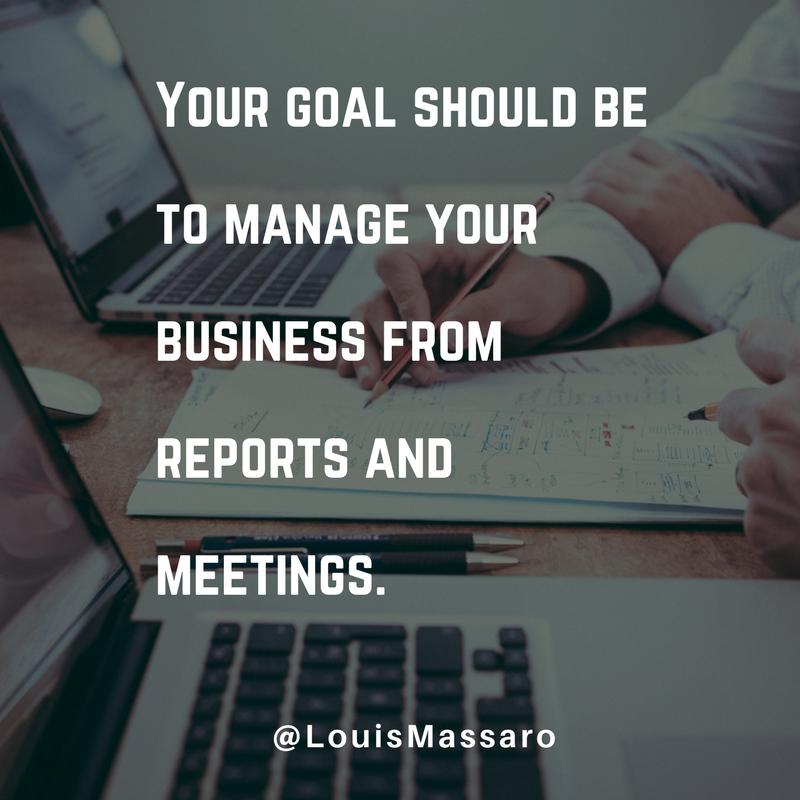

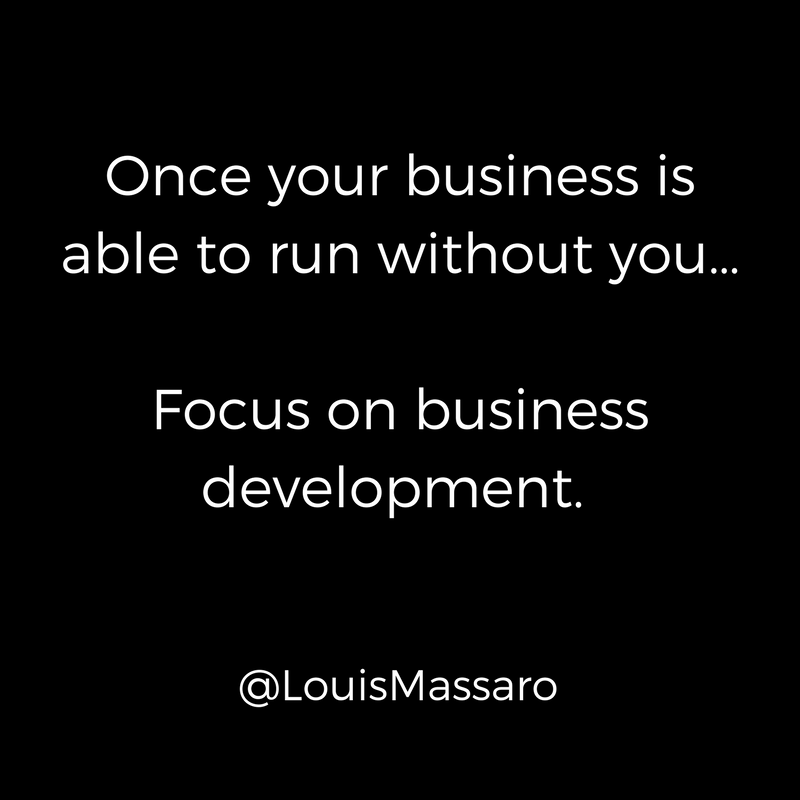
Full Transcript
[The following is the full transcript of this episode.]
Hey, my friend. It’s Louis Massaro, CEO of Moving Mastery and founder of Moving Sales Academy. I don’t know about you, but for me, the ultimate goal is to work on my business, not in my business. And what I mean by that is when you start a moving company, you don’t really wanna create a job for yourself, do you? You don’t wanna have to go there every single day and work every single day. That’s what you need to do to get it going, but don’t you wanna create a system and a process and have good people in place to where you can step back and not have to be there on the day-to-day basis to make sure that the trucks get out, make sure that the moves get booked? Well, that’s what I wanna walk you through. I wanna walk you through the steps to work on your business and not in your business. There’s a big difference. When you work in your business, you’re essentially one of your own employees. You’re filling a key role for the company whether you’re dispatching on a day-to-day basis, whether you’re answering the phone and booking moves, whether you’re doing your own accounting… That’s you working in the business.
When you’re working on your business, your business is running without you, and you’re able to basically work on growing your business, improving your business, implementing new processes and business development that’s gonna help grow your company. That’s working on your business, and if you want to grow, the only way to grow is to first be able to take a step back and work on your business. So I want to walk you through the steps on how to do that. First thing you need to do… Sounds counterintuitive, but the first thing you need to do is work in your business to create the processes. These are the stages that you’re gonna go through. So even if you’re just starting out right now, this is for you, also. You might say, “I’m never gonna be able to to just work on my business. I’m the only one here.” Or, “It’s only a couple of us.” It all starts that way. It started with me that way. Basically, when I first started my company, I was the only one doing it for months. Six months, I was the only one. I answered the phones. I dispatched the trucks. I was the warehouseman. I did the claims. I did the storage billing. I did everything. But then I was able to train people, bring people in, get a team behind me to where I wasn’t working in my business and I was able to grow and expand.
When you have several locations, there’s no way you can work in those additional locations. You can’t be everywhere at once, so you have to have a formula for working on your business. But it all starts with first working in your business to create the processes that you’re gonna then be able to teach others to run your company. So the second step is to start training and grooming your replacement. And this could be in each and every single department. Whether your first hire might be a dispatcher, you wanna spend the time with them, once you’ve already established what your processes are, training them and grooming them to take over that position. And then maybe you move into just doing sales, and now you have someone to handle dispatch. And then you get somebody to come in and handle sales, and you train them and groom them, and you move away. So with each and every department, you’re gonna need to train and groom a replacement for yourself so you can start to step away department by department.
The next step is you’re gonna fine-tune your systems and your SOPs. So you’ve already created a process. You’ve started to train and groom one person or several people to take over those processes. And now that you see what it’s like for somebody else to be running them on a day-to-day basis, you’re gonna wanna fine-tune those processes and your SOPs, which are standard operating procedures. Basically, how to do dispatch step-by-step, how to take an inbound call step-by-step. Those are your standard operating procedures. You’re gonna wanna fine-tune those. And the next step is you’re gonna wanna develop your KPIs. Your KPIs are your key performance indicators. These are the numbers and the metrics in your reporting that are gonna allow you to manage your business based on the numbers. But first you have to establish what those are. Are you gonna be looking at your booking percentage to see how your sales are doing? Are you gonna be looking at your average move to see how your operations are doing? Are you gonna be looking at the amount of packing sold per move? Are you gonna be looking at… I don’t know… Attendance rates for sales reps? Whatever it is that you’re gonna develop your KPIs, you’re gonna wanna make sure that you have these setup so that you can go on to the next step, which is manage your business from reports and meetings.
This is possible. This is how I ran my business for years. Once I set everything up and I had the right people in place and the systems in place and the standard operating procedures, I basically was able to see what was going on by the numbers. And you don’t have to be a numbers person to do this. You don’t have to be a mathematician to do this. You just have to set up the proper KPIs. The proper numbers to where you know, “Hey, if it goes over this point, that’s good. If it goes under this point it’s a problem, and I need to do something about it.” Once you have those set up, you have daily reports. You have weekly reports. You have monthly reports, quarterly reports, yearly reports that allow you to run your business, and then when there’s issues and there’s problems, you have meetings with your team to address them and start correcting whatever issues there are.
Then, final step after that is you focus on business development. This means different things for different people. If you wanna have one solid company, you focus on different ways to improve. You take a step back, essentially. That’s what you’re doing. You’re working on your business. I’m not saying leave and never come back, I’m not saying set some people up and disappear and just wait for your pay checks and get ’em in the mail and you never have to look at your business. No. You’re managing your business based on reports, based on having meetings with your team, and now you’re focusing on ways to improve the business. You’re focusing on ways to bring in more business, become more profitable or to expand. Once you’re at this point, now you can expand. You wanna open additional locations? Now you have the ability to do that, but if you’re working in your business… If you’re required to come in every day and dispatch your own trucks and you try to open up an additional location, it’s gonna be very difficult to operate that. It’s gonna be very difficult to have your current business running smoothly and your new location running smoothly. You need to get yourself to be able to step back to where you could watch everything from afar and make tweaks and adjustments, and that’s what’s gonna help you get to that next level.
So anybody can do this. Remember if you don’t know my story, I started off renting two trucks, working out of a truck rental yard with no money. I developed my system, I brought people on, I started grooming them, I took a step back, I started to perfect my SOPs. I started to run my company off of reports and meetings. I started working on business development. I grew and I expanded and eventually we were doing $20 Million year. I’m just a regular guy, I didn’t go to college, I didn’t know what I was doing when I got into business. You can do this as well. So unless you just wanna create a job for yourself, unless you just wanna be your own boss and have a place to go to work every day, focus on being able to work on your business and not in your business and allow yourself the gift to be able to grow and get to that next level. Push yourself to get there, alright. If you have any questions on how to do this, leave them in the comments below, I’ll be more than happy to answer ’em for you. I hope this was helpful. Until I see next week, go out and profit in business, thrive in life. I’ll see you later.

